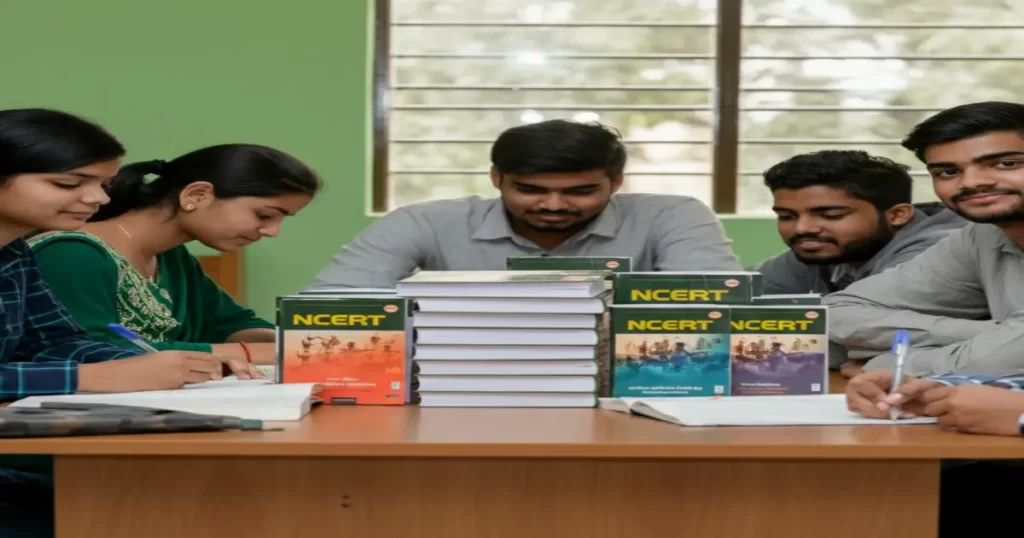Preparing for State Public Service Commission (PSC) exams can be overwhelming, especially with these tests’ vast syllabus and competitive nature. Aspirants often wonder where to begin and how to build a strong knowledge base. The answer lies in NCERT books.
Highly recommended by successful candidates and experts alike, NCERT books provide a reliable foundation for exam preparation. This guide will walk you through the importance of NCERT books in PSC exams, how to study them effectively, and additional tips for success.
By the end of this blog, you’ll have a clear roadmap to using NCERT books to maximize your PSC preparation and edge out the competition.
Understanding the PSC Exam Syllabus
Before opening a single book, it’s crucial to understand the syllabus for the PSC exam you’re appearing for. The syllabus forms the blueprint of your preparation and dictates which areas require more focus.
PSC syllabi usually cover key subjects like history, geography, politics, economics, and science, each covered extensively in NCERT books. Once you analyze the syllabus, you’ll notice how NCERT books align seamlessly with the topics prescribed, making them indispensable for preparation.
Pro Tip
Bookmark your syllabus and use it as a checklist when studying NCERT chapters. This ensures you don’t miss any relevant topics.
Why NCERT Books Are Essential
1. Building a Strong Foundation
NCERT books are known for their simple explanations and conceptual clarity, making them ideal for beginners. Starting with NCERTs lets you grasp fundamental topics before moving on to advanced study materials.
2. Reliable and Authentic Information
Unlike some coaching materials that may contain errors, NCERT books are published by the Government of India and offer 100% accurate content. This gives you peace of mind while studying, knowing the information is reliable.
3. Comprehensive Coverage of Syllabus
NCERT books cover basic and advanced topics and often align directly with PSC exam trends. They even form the basis for many exam questions, particularly in History and Geography.
Which NCERT Books should you study for PSC exams?
Here’s a subject-wise breakdown of recommended NCERT books for PSC preparation:
History
- Class 6–8: Our Past Series – Ancient and Medieval India
- Class 9–10: India and the Contemporary World
- Class 11–12: Themes in Indian History
Geography
- Class 6–8: The Earth Our Habitat, Resources and Development
- Class 9–10: Contemporary India
- Class 11–12: Fundamentals of Physical Geography, India – People and Economy
Polity
- Class 6–8: Social and Political Life
- Class 11–12: Indian Constitution at Work, Political Science
Economics
- Class 9–12: Understanding Economic Development, Indian Economic Development
Science
- Class 6–8: General Science NCERTs for clarity of basics
- Class 9–10: Science (focus on Physics, Chemistry, and Biology)
Pro Tip
Focus on Class 11 and Class 12 NCERTs for deeper insights into core subjects, but don’t skip lower standards—their simple explanations can be invaluable for basic clarity.
How to Study NCERT Books Effectively
1. Active Reading Techniques
- Highlight key terms and concepts as you read.
- Create flashcards for terms, dates, and definitions.
- Ask yourself self-assessment questions after each chapter to check comprehension.
2. Note-Making Strategies
- Summarize chapters in your own words to aid retention.
- Use diagrams, flowcharts, and tables to simplify complex topics.
- Prioritize making concise notes for quick revisions later.
3. Integrating with Other Study Materials
- After mastering the basics, combine NCERT books with advanced sources like reference books or coaching materials.
- Watch YouTube videos or lectures to supplement your understanding.
Tips and Tricks for Quick Revision
- Use one-pagers or sticky notes to jot down essential points for frequent review.
- Allocate the last 10–15 minutes of each study session for revising previously learned topics.
- Attempt questions from past year PSC exams to assess your grasp of NCERT concepts.
Common Mistakes to Avoid While Using NCERT Books
- Reading Without a Plan: Always study with a roadmap aligned with your syllabus.
- Skipping Questions at the End of Chapters: These reinforce what you’ve learned and often mirror exam patterns.
- Overloading Yourself: Stick to NCERT books for the basics. Don’t clutter your preparation with too many resources early on.
Case Studies: Success Stories of Aspirants
- Meera Sharma, MPPSC Topper
Meera successfully revised Class 6–12 History and Polity NCERT books three times before moving to higher-level materials. Her disciplined approach helped her score top marks in General Studies.
- Ravi Kumar, UPPSC Rank #23
Ravi found NCERT books instrumental in mastering Economics and improving his conceptual clarity. He paired NCERTs with mock tests, scoring exceptionally well in Prelims.
These stories prove that a well-structured NCERT-based strategy can make all the difference!
Additional Resources for PSC Exam Preparation
While NCERT books form a strong base, consider supplementing them with these resources for a more holistic preparation strategy:
- Mock Tests and Previous Year Question Papers
- Standard Reference Books like Laxmikanth for Polity and Spectrum for History
- Mobile Apps for PSC preparation (e.g., BYJU’s, Unacademy)
- PSC Prep Websites/Telegram Groups for Community Learning
Master Your PSC Preparation with NCERT Books
NCERT books are an indispensable tool for State PSC aspirants. They ensure you approach your preparation with confidence and clarity by providing a solid foundation, reliable information, and detailed coverage.
Follow this guide, and you’ll find that NCERT books simplify complex topics and empower you to ace your exams.
Need personalized guidance? Start your PSC preparation today with expert-curated study plans tailored to your strengths and weaknesses!

